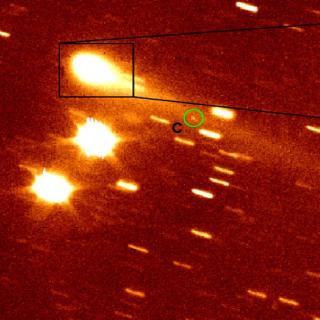Bibcode
Pinilla-Alonso, N.; Licandro, J.; Lorenzi, V.
Referencia bibliográfica
Astronomy and Astrophysics, Volume 489, Issue 1, 2008, pp.455-458
Fecha de publicación:
10
2008
Revista
Número de citas
19
Número de citas referidas
17
Descripción
Context: The recent discovery of a group of trans-neptunian objects
(TNOs) in a narrow region of the orbital parameter space and with
surfaces composed of almost pure water ice, being 2003 EL{61} its
largest member, promises new and interesting results about the formation
and evolution of the TNb and the outer Solar System. Aims: The
aim of this paper is to obtain information of the surface properties of
two members of this group ((24835) 1995 SM{55}, (120178) 2003 OP{32})
and three potential members (2003 UZ{117}, (120347) 2004 SB{60} and 2005
UQ{513}) and to use that in order to confirm or reject their
association. Methods: We obtained visible spectra of five TNOs
using the 3.58 m Telescopio Nazionale Galileo at the “Roque de los
Muchachos Observatory” (La Palma, Spain). Results: The
spectra of the five TNOs are featureless within the uncertainties and
with colors from slightly blue to red (-2 < S' < 18%/0.1 μm).
No signatures of any absorption are found. Conclusions: We
confirm the association of 1995 SM{55} and 2003 OP{32} with the group of
2003 EL{61} as their spectra are almost identical to that of 2003
EL{61}. Only one of the three candidates, 2003 UZ{117}, can be
considered as a possible member of the EL{61}-group, as its visible
spectrum is compatible with a spectrum of a surface composed of almost
pure water ice and no complex organics. The other two, 2004 SB{60} and
2005 UQ{513} are red and must be considered as interlopers.
Proyectos relacionados

Pequeños Cuerpos del Sistema Solar
Este Proyecto estudia las propiedades físicas y composicionales de los llamados pequeños cuerpos del Sistema Solar, que incluyen asteroides, objetos helados y cometas. Entre los grupos de mayor interés destacan los objetos trans-neptunianos (TNOs), incluyendo los objetos más lejanos detectados hasta la fecha (Extreme-TNOs o ETNOs); los cometas, y
Julia de
León Cruz